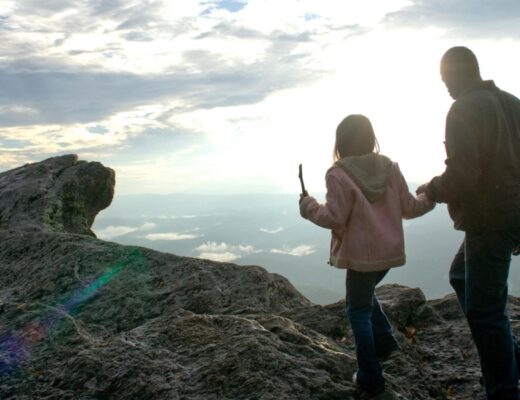Adapted from Paolo Cognetti’s award-winning novel of the same name, The Eight Mountains opens with a young man’s voiceover accompanying a series of natural Italian landscapes. The voice belongs to Pietro, the only son of Torinese middle-class parents — his father a factory engineer, his mother a teacher — who recounts the story of his childhood years, specifically a summer holiday in 1984 when he finds an opportunity to leave the hubbub of city life and experience the simplicity of living in a remote Alpine village called Grana. It is in Grana where he first encounters Bruno, another boy of similar age, with whom he forms a close and solid friendship despite their apparent behavioral and class differences. In quite the same manner, the Belgian directorial duo of Felix Van Groeningen (The Broken Circle Breakdown, Beautiful Boy) and Charlotte Vandermeersch conjure an intimate and tender portrait of a buddy story that progresses toward delineating a grander landscape of social concerns. It’s especially easy, after we see the two kids roaming the pastoral valleys, joyously playing in the village’s alleyways, and accompanying Pietro’s father during his regular mountain climbing, to recall, like Pietro, his old man’s saying: “Every season of light needed to be followed by a dark one. A time of toil, tediousness, and gloom.” Sure enough, the change of season arrives when the kids reach adulthood: Pietro is now a young man with no clear purpose, living from moment to moment, clubbing or spending time with his new, bourgeois friends, while Bruno is forced to make a living in the city as a construction worker. This grave transition marks the beginning of their diverging paths, which last for about fifteen years, until Pietro’s father dies.
It’s this death that provides a crucial narrative point in Van Groeningen and Vandermeersch’s narrative, and reveals some of the more metaphorical aspects of The Eight Mountains. What begins something like a reminiscence of Vittorio De Sica’s earlier works (those which mainly revolved around child characters), and later evokes the familial crises or brotherly struggles of Luchino Visconti’s Rocco and His Brothers, eventually turns into a collision of different Italian neorealist approaches. Bruno shows Pietro a collapsed shelter that had been built by his father in the mountains near their old holiday retreat, and as he suggests that they rebuild the cabin together, the film’s symbolic intonations are plainly revealed. On one level, it’s an ideal synthesis between the opulent, industrialized Italian cities and traditional peasant villages, between the middle and working classes, and between childhood innocence and adult responsibility. In one sequence, Pietro confesses that “[his] life seemed partly that of a man, partly that of a boy,” somewhat emblematic of the necessity for mutual understanding between the country’s alienated cultures that are required to reconstruct and redeem the old land’s heritage. On the other hand, it’s certainly possible to argue that this straightforward narrative frequently dilutes the depth of dramatic incident, with the weight of both The Eight Mountains’ inter- and intrapersonal conflicts comparable to an underdeveloped, hastily expanded old-school European TV drama. Fortunately, Van Groeningen and Vandermeersch’s directorial instincts cohere well enough with Ruben Impen’s awe-inspiring cinematography to ground the more inevitable dimensions of this decades-long bildungsroman within a bittersweet tale of friendship and self-realization. Amid the delicate balance of personal feelings and broader, more thrilling developments, the filmmakers have fashioned convincingly palpable human relationships — also thanks to the cast’s unassuming but reliable chemistry — and an invigorating atmosphere that nonetheless provides enough space and quiet for our patient, contemplative eyes.
Published as part of InRO Weekly — Volume 1, Issue 17.







